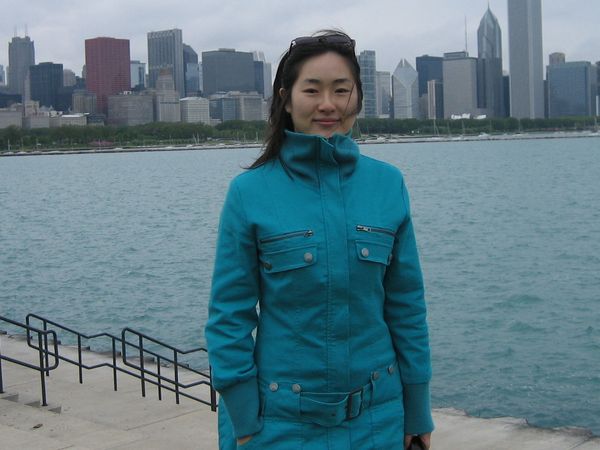People

Professor ZHU Jiangnan 朱江南
Associate Professor: Jiangnan Zhu is an Associate Professor of Department of Politics and Public Administration. She got bachelor degrees of International Relations and Economics from Peking University, M.S. of Mathematical Models of Social Sciences and Ph. D of Political Science from Northwestern University. Before joining University of Hong Kong, she was an Assistant Professor at University of Nevada, Reno. Professor Zhu’s research interests include comparative political economy in developing and transitional countries, especially Chinese politics, corruption and anticorruption in China, political trust, and media in China. She is also the Coordinator of the China Studies Major/Minor.
- Phone: 3917 2278
- E-mail: zhujnhku.hk
- Office: C933
- https://hub.hku.hk/cris/rp/rp01624
Selected Publications
- Jiangnan Zhu, Steve Bai, Siqin Kang, Juan Wang, Kaixiao Liu, "Authoritarian Cue Effect of State Repression", American Journal of Political Science, online first (open access), https://doi.org/10.1111/ajps.12916
- Wanlin Lin, Siqin Kang, Jiangnan Zhu, and Li Ding, "Till We Have Red Faces: Drinking to Signal Trustworthiness in Contemporary China" Public Choice, online first (open access).
- Chengli Wang, Jiangnan Zhu, and Dong Zhang, "The Paradox of Information Control Under Authoritarianism: Explaining Trust in Competing Messages in China", Political Studies, online first.
- Jiangnan Zhu and Weijia Chen, "Promoting China out of Self-interest: Chinese Diaspora Diplomacy in Chile", Journal of Ethnic and Migration Studies, online first.
- Jiangnan Zhu, Hanyu Xiao, and Bin Wu, "From Big Data to Higher Bureaucratic Capacity: Poverty Alleviation in China", Public Administration, online first
- Jing Vivian Zhan and Jiangnan Zhu, "Policy Coordination and Selective Corruption Control in China", Policy Studies Journal, forthcoming.
- Jiangnan Zhu, "The Rise and Fall of Ruling Oligarchs: Fighting 'Political Corruption' in China", The China Review, Vol.22, No. 2 (May 2022), 49-79.
- Jiangnan Zhu and Bo Wen, "Trace the Money, Seize the Fugitives: China’s Other Anticorruption Battle", Journal of Contemporary China, online first
- Jiangnan Zhu and Nikolai Mukhin, "The Modern Regency: Leadership Transition and Authoritarian Resilience of the Former Soviet Union and China", Communist and Post-Communist Studies, Vol. 54, Number 1-2, pp. 24–44.
- Jiangnan Zhu, "Out of China’s Reach: Globalized Corruption Fugitives" The China Journal, no.86, July 2021.
- Jiangnan Zhu and Chengli Wang, “I Know What You Mean: Information Compensation in an Authoritarian Country”, International Journal of Press/Politics, online first, 2020
- Siqin Kang and Jiangnan Zhu, “Do People Trust the Government More? Unpacking the Distinct Impacts of Anticorruption Policies on Political Trust”, Political Research Quarterly, online first, 2020
- Jiangnan Zhu and Hui Li, “Elite Power Competition and Corruption Investigation in China: A Case Study” Modern China, Vol 17, Issue 3 (May 2020), pp.307-335.
- Jiangnan Zhu, Huang Huang, and Dong Zhang, "Big Tigers, Big Data": Learning Social Reactions to China's Anticorruption Campaign through Online Feedback, Public Administration Review, online first.
- Jiangnan Zhu and Dong Zhang. (forthcoming). “Weapons of the Powerful: Authoritarian Elite Competition and Politicized Anticorruption in China,” Comparative Political Studies
- Jiangnan Zhu and Dong Zhang, “Does Corruption Hinder Private Businesses? Leadership Stability and Predictable Corruption in China”, Governance: An International Journal of Policy, Administration, and Institutions, Jun 2016 online first
- Jiangnan Zhu, Qi Zhang, and Zhikuo Lu, “Eating, Drinking, and Power Signaling in Institutionalized Authoritarianism: The Antiwaste Campaign of Xi Jinping”, Journal of Contemporary China, May 2016 accepted.
- Yiping Wu and Jiangnan Zhu, “When Are People Unhappy? The Corruption Experiences, Environment, and Happiness in Mainland China,” Journal of Happiness Studies, Vol 17, No. 3 (June 2016), pp. 1125-1147.
- Juncheng Feng, Kezhong Zhang, and Jiangnan Zhu, “How Political Turbulence Changes Disincentives of Environmental Protection: Evidence from Crime Crackdown in Chongqing”, Social Indicators Research, Oct 2015 online first.
- Huibing Zhao and Jiangnan Zhu, “Social Impetus, Economic Roots and Political Logic: China’s Transformation through the Lens of American History,” The Chinese Economy, Vol. 47, No. 6 (November–December 2014).
- Xin Sun, Jiangnan Zhu, and Yiping Wu, “Organizational Clientelism: An Analysis of Private Entrepreneurs in Chinese Local Legislatures,” Journal of East Asian Studies, Vol.14, No. 1 (2014), pp.1-29.
- Jiangnan Zhu and Yiping Wu, “Who Pays More 'Tributes' to the Government? Sectoral Corruption of China’s Private Enterprises,” Crime, Law and Social Change, Vol.64 (2014), pp.309-333.
- Jiangnan Zhu and Jie Lu, “One Rising China, Multiple Interpretations: World Representation of China’s 60th Anniversary Celebration,” Journal of Contemporary China, Vol. 22, No.84, (November 2013), pp 1067-1088.
- Jiangna Zhu, Jie Lu, and Tianjian Shi, “When Grapevine News Meets Mass Media: Different Information Sources and Perceptions of Government Corruption in Mainland China,” Comparative Political Studies, Vol. 46, Issue 8, (August 2013), pp. 920-946.
- Jiangnan Zhu and Xueyong Wang, “Unveiling the Political Elites: High-Rank Chinese Officials on Television Talk Shows,” Journal of Chinese Political Science, Vol. 18, No.2, (July 2013), pp. 117-137.
- Zhenpo Wang and Jiangnan Zhu, “The Evolution of China’s City Size Distribution: Empirical Evidence from 1949 to 2008,” The Chinese Economy, Vol. 46, No. 1, (January-Feburary 2013), pp. 38-54.
- Jiangnan Zhu, “Do Severe Penalties Deter Corruption? A Game Theoretic Analysis of the Chinese Case,” China Review: An Interdisciplinary Journal on Greater China, Vol. 12, No.2 (Autumn 2012), pp. 1-32.
- Jiangnan Zhu, “The Shadow of the Skyscrapers: Real Estate Corruption in China,” Journal of Contemporary China, Vol.21, No.74, (March 2012), pp. 243-260.
- Yiping Wu, and Jiangnan Zhu, “Corruption, Anticorruption, and Intercounty Income Disparity in China,” Social Science Journal, Vol. 48, Issue 3 (September 2011), pp.435-448.
- Jiangnan Zhu, “Why Are Offices for Sale in China? A Case Study of the Office-Selling Chain in Heilongjiang Province,” Asian Survey, Vol. 48, Issue 4, (July/August 2008), pp.558-579.